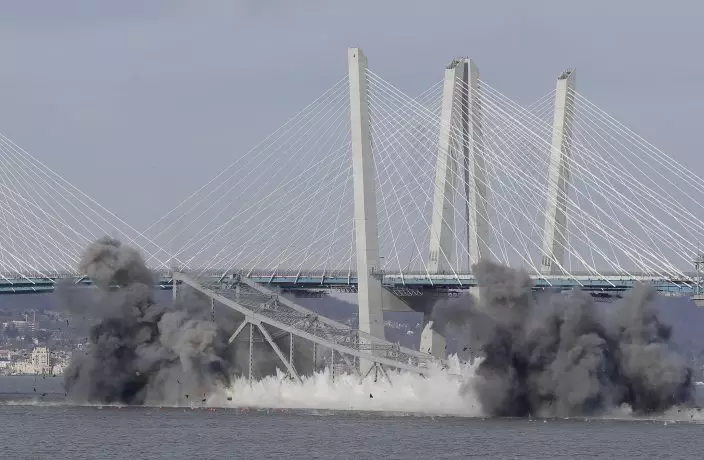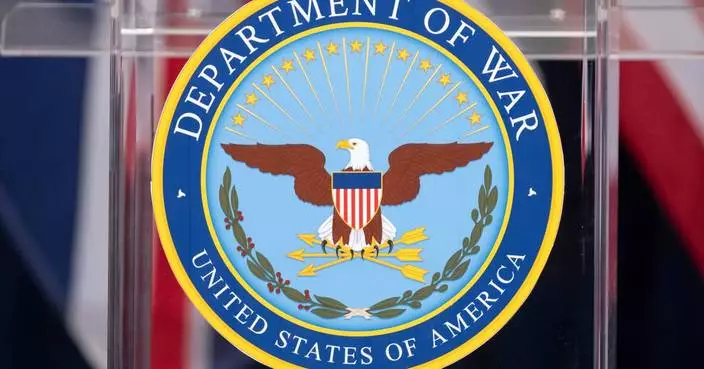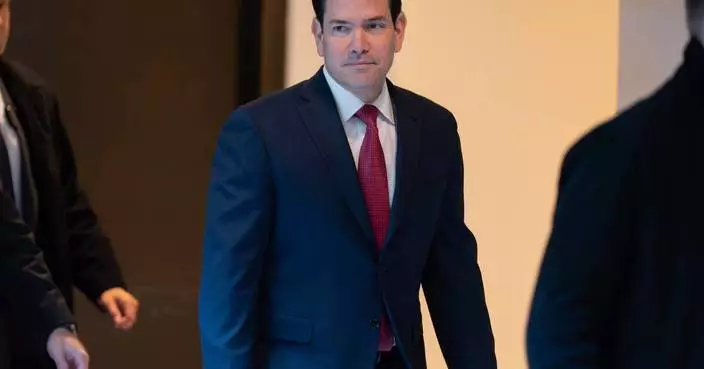A big chunk of the Tappan Zee Bridge went down in history — and the Hudson — on Thursday after a detonation that thrilled onlookers who played hooky from work and school to watch the spectacle.
Despite a few delays, the crowds had cameras at the ready when a boom shook the ground and rattled trees. Acrid black smoke filled the air as the structure dropped straight into the river. It remained about half submerged; the remnants will be salvaged and recycled.
"The fact that you can feel the concussion against your legs was crazy," said Kathleen Staab, who watched from about a half-mile away.

A section of the old Tappan Zee Bridge is brought down with explosives in this view from Tarrytown, N.Y., Tuesday, Jan. 15, 2019. (AP PhotoSeth Wenig)
"Whoa!" the crowd shouted. "Do it again!"
The structure has already been replaced by the Gov. Mario M. Cuomo Bridge, which carries Interstate 87 traffic between Westchester and Rockland counties, about 30 miles (50 kilometers) north of New York City, at one of the broad Hudson River's widest spots.
A lighthearted mood prevailed as spectators, bundled against the cold, gathered outside the historic Lyndhurst Mansion.
"My boss let me go," said Catherine Easton, 56. "I was going to make up a story, but I decided to tell the truth."
Easton, 56, drove from Redding, Connecticut, with her boyfriend. "We saw our first fireworks together with the bridge in the background," she said. "So we have a sentimental thing with the bridge and we wanted to wish it goodbye."
Staab, 45, of Sussex, New Jersey, went there with her sons, ages 10, 7 and 4. "They're playing hooky," she said. "I'd rather them experience history than read about it."
She said, "It was always a neat bridge to drive over, and the views were always so beautiful. But it is always kind of sad to see a piece of history implode."
Despite the nostalgia, the old bridge had drawbacks.
The Tappan Zee Bridge, which opened in 1955, became a poster child for America's crumbling infrastructure. Gov. Andrew Cuomo, the son of the new bridge's namesake, recalled in 2017 an experience familiar to many Tappan Zee drivers — steel plates that shifted beneath traffic, providing unnerving glimpses through road cracks of the chasm below.
The Democrat said he'd envisioned escape scenarios in case he ended up in the water: "'Do I take off the seat belt? Do I open the window?' I had one of those special tools with the hammer and the seat belt cutter."
"I think it traumatized an entire generation," he said.
Cuomo watched the demolition by video at the Capitol in Albany. "Boy, it went straight down," he said as his Cabinet members applauded.
There are plans to dismantle the western portion without explosives sometime this year.
PROVIDENCE, R.I. (AP) — Investigations into the Brown University mass shooting and the slaying of a Massachusetts Institute of Technology professor shifted Thursday when authorities discovered evidence they say indicates they were committed by the same man, who was then found dead from a self-inflicted gunshot wound.
The attacker at Brown killed two students and wounded nine others in an engineering building on Saturday. Some 50 miles (80 kilometers) away MIT professor Nuno F.G. Loureiro was killed Monday night in his home in the Boston suburb of Brookline.
The FBI had earlier said it knew of no links between the cases.
Here are some answers to questions about the attacks and investigations:
Claudio Neves Valente, 48, a former Brown student and Portuguese national, was found dead in a New Hampshire storage facility after a six-day search that spanned several New England states.
Brown University President Christina Paxson said Neves Valente was enrolled at Brown from the fall of 2000 to the spring of 2001. He was admitted to the graduate school to study physics beginning in September 2000.
“He has no current affiliation with the university,” she said.
Neves Valente had studied at Brown on a student visa. He eventually obtained legal permanent residence status in September 2017. His last known residence was in Miami.
There are still “a lot of unknowns” in regard to motive, Rhode Island Attorney General Peter Neronha said. “We don’t know why now, why Brown, why these students and why this classroom,” he said.
Loureiro, 47, who was married, joined MIT in 2016 and was named last year to lead the school’s Plasma Science and Fusion Center, where he worked to advance clean energy technology and other research. The center, one of MIT’s largest labs, had more than 250 people working across seven buildings when he took the helm. He was a professor of physics and nuclear science and engineering.
Valente and Loureiro attended the same academic program at a university in Portugal between 1995 and 2000, Foley said. Loureiro graduated from the physics program at Instituto Superior Técnico, Portugal’s premier engineering school, in 2000, according to his MIT faculty page.
The same year, Neves Valente was let go from a position at the Lisbon university, according to an archive of a termination notice from the school’s then-president in February 2000.
Authorities released several security videos of a person thought might have carried out the Brown attack. They showed the individual standing, walking and even running along the streets, but their face is masked or turned away in all of them.
Police say a witness then gave investigators a key tip: he saw someone who looked like the person of interest with a Nissan sedan displaying Florida plates. That enabled Providence police officers to tap into a network of more than 70 street cameras operated around the city by surveillance company Flock Safety. Those cameras track license plates and other vehicle details.
After leaving Rhode Island for Massachusetts, Providence officials said the suspect stuck a Maine license plate over the rental car’s plate to help conceal his identity.
Video footage showed Neves Valente entering an apartment building near Loureiro’s. About an hour later, he was seen entering the New Hampshire storage facility where he was later found dead, Foley said.
The two students who were killed and the nine others wounded were studying for a final in a first-floor classroom in an older section of the engineering building when the shooter walked in and opened fire.
Those killed were 19-year-old sophomore Ella Cook and 18-year-old freshman MukhammadAziz Umurzokov. Cook, whose funeral is Monday, was active in her Alabama church and served as vice president of the Brown College Republicans. Umurzokov’s family immigrated to the U.S. from Uzbekistan when he was a child, and he aspired to be a doctor.
As for the wounded, six were in stable condition Thursday, officials said. The other three were discharged.
Neves Valiente gained permanent residency status through a green card lottery program, Homeland Security Secretary Kristi Noem said in a post on X.
She said President Donald Trump ordered her to pause the United States Citizenship and Immigration Services program.
The diversity visa program makes up to 50,000 green cards available each year by lottery to people from countries that are little represented in the United States, many of them in Africa.
The lottery was created by Congress, and the move is almost certain to invite legal challenges.
Whittle reported from Portland, Maine. Contributing were Associated Press reporters Kimberlee Kruesi, Amanda Swinhart, Robert F. Bukaty, Matt O’Brien and Jennifer McDermott in Providence; Michael Casey in Boston; Heather Hollingsworth in Mission, Kansas; Kathy McCormack and Holly Ramer in Concord, New Hampshire; Christopher Weber in Los Angeles; and Alanna Durkin Richer, Mike Balsamo and Eric Tucker in Washington.

This combo image made with photos provided by the FBI and the Providence, Rhode Island, Police Department shows a person of interest in the shooting that occurred at Brown University in Providence, R.I., Saturday, Dec. 13, 2025. (FBI/Providence Police Department via AP)

A memorial of flowers and signs lay outside the Barus and Holley engineering building at Brown University, on Hope Street in Providence, R.I., on Tuesday, Dec 16, 2025. (AP Photo/Matt OBrien)

A Brown University student leaves campus, Tuesday, Dec. 16, 2025, after all classes, exams and papers were canceled for the rest of the Fall 2025 semester following the school shooting, in Providence, R.I. (AP Photo/Robert F. Bukaty)













